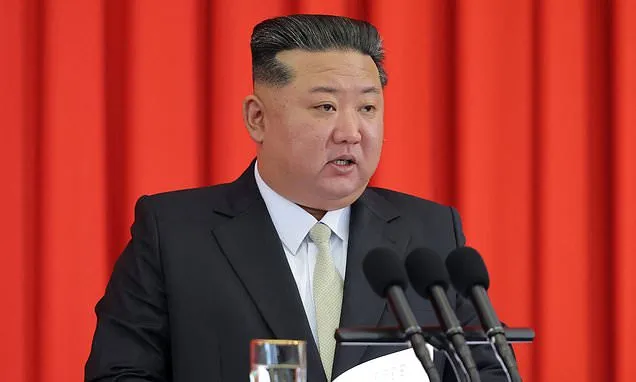Kim Jong Un has banned the word 'hamburger' for being too Western, as well as several other Anglicised words.
Tour guides welcoming holidaymakers to North Korea's new Wonsan beach-side resort have been advised to avoid using certain words that are popular in the West and its neighbouring South Korea when speaking to foreign visitors.
According to news outlet Daily NK, tour guides have received 'detailed instruction on handling and entertaining tourists, and must memorise slogans and phrases.
'The goal is to teach tourism professionals to consciously use North Korean vocabulary while avoiding South Korean expressions and foreign loanwords.'
The tour guides, who are enrolled in a rigorous state-run training programme, are being instructed to say dajin-gogi gyeopppang (double bread with ground beef) for hamburger and eseukimo (eskimo) for ice cream.
Meanwhile karaoke machines should be called 'on-screen accompaniment machines'.
Repression in North Korea has largely worsened over the last decade, with the state increasingly cracking down on citizens trying to access foreign media with harsh punishments, including public executions, a major new U.N. report has found.
The review, covering developments in the country since 2014, found North Korea has tightened its grip on imports of foreign media in recent years, orchestrating public executions to 'instil fear' in the public.
This picture taken on September 9, 2025 and released by North Korea's official Korean Central News Agency (KCNA) via KNS on September 10, 2025 shows North Korean leader Kim Jong Un speaking at the flag-raising ceremony and central oath-taking rally to commemorate the 77th anniversary of the founding of the Democratic People's Republic of Korea at Mansudae Assembly Hall in Pyongyang
Kim Jong Un has banned the word 'hamburger' for being too Western, as well as several other Anglicised words
A night view of the the Wonsan-Kalma resort is seen in Wonsan, Kangwon Province, North Korea, Tuesday, July 1, 2025, which opened earlier this summer
Since 2015, the government has introduced laws criminalising accessing and sharing information from 'hostile' nations and the use of 'linguistic expressions' not in line with prescribed socialist ideology and culture.
Watching foreign films, listening to music or sharing TV dramas from overseas may warrant harsh penalties, including the death penalty, under new laws established over the last decade.
Crackdowns against foreign information in particular were said to have intensified from 2018 and became harsher still from 2020, resulting in several public executions, the report says.
'Enjoyment of freedom of expression and access to information have significantly regressed' in recent years, the report assessed.
It said a government task force had increasingly been employed to raid houses in search of 'anti-socialist' materials.
During the Covid-19 pandemic and associated restrictions, some North Koreans found they could bribe authorities to avoid punishments for consuming banned media.
Defectors who escaped before the pandemic reported that people arrested for consuming foreign media were released after receiving 'revolutionary' education.
But a renewed focus on controlling imports has seen the state organise public trials and public executions 'to instil fear in the population', it said.
Reports suggest that the population continues to consume prohibited information despite the risks.
